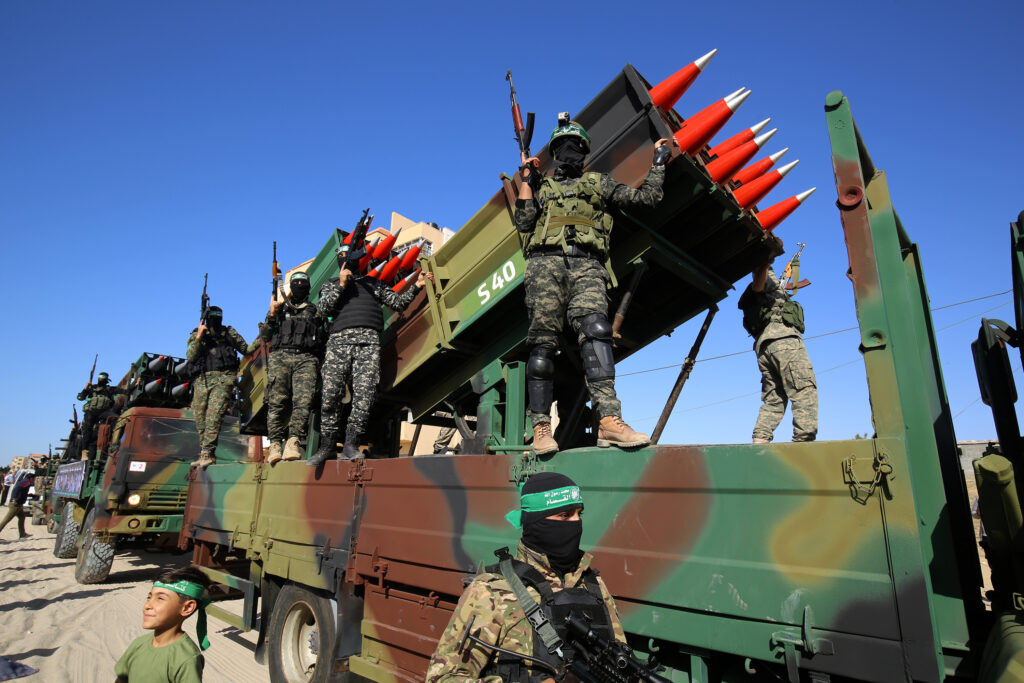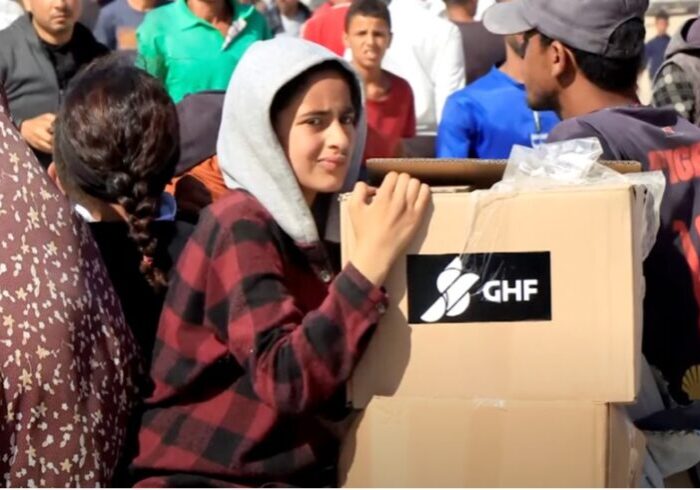Australia/Israel Review
Can Hamas be defeated?
May 31, 2024 | Ghaith al-Omari

Since Hamas’ attack against Israel on October 7 and the devastating war that Israel launched in response, the common wisdom has been that Hamas cannot be eradicated since ideologies cannot be defeated militarily. As a corollary, it is also often argued that military force threatens the exact opposite: radicalising a new generation of Palestinians – particularly in Gaza, swelling the Hamas ranks with new recruits.
Both arguments are wrong.
While military action may not fully eliminate an ideology, it can definitely deny it the tools to be effective and render it irrelevant. For its part, the argument about radicalisation discounts human agency, just as it discounts many historical analogies where war led to a better, more stable future.
It is said that “bullets cannot defeat ideas.” Such slogans are catchy and – at surface level – true. But they are also misleading. Ideologies rarely disappear. In this regard, Hamas is not unique.
There are few instances, if any, where an ideology is completely eliminated militarily. The Nazis, al-Qaeda, and Islamic State (IS) all faced overwhelming military defeat and were thoroughly discredited morally, yet none were eliminated. There will always be some who believe in such abhorrent ideologies, and there will always be circumstances that may lead to their resurgence.
Even in less extreme cases, such as the Muslim Brotherhood, successive attempts to defeat it or co-opt it have not eliminated it nor prevented its periodic resurfacing. Those who argue against war on the grounds that it cannot permanently eliminate Hamas are judging by an unachievable standard.
From Threat to Irritant
Such ideologies and organisations (including Hamas) can be sufficiently defeated so as to turn them from major threats to marginal irritants – albeit dangerous ones that can manifest themselves in ways that exact tragic human tolls. What makes Hamas and similar militant organisations effective is not their ideology but their ability to act on them. For Hamas, its sustained capacity to use violence was key to helping it build political power.
Back in the 1990s, Hamas’ popularity was at its lowest point, as most Palestinians believed that liberation could be achieved by peaceful and diplomatic means. Its use of violence derailed that concept, but it established Hamas as a political alternative.
Ever since, the use of force and violence has been an integral part of Hamas’ strategy. Using political or economic incentives has repeatedly failed to transform, moderate or marginalise Hamas for the simple reason that its ability to use violence has proved an effective way to achieve its goals, whether in terms of scuttling the peace process or violently taking control of Gaza in 2007.
Indeed, one lesson from October 7 is that while Hamas maintains its military and violence capabilities, it will remain capable of shaping the political reality. To be defeated, Hamas must be denied that. This can only be done through the use of force.
Steep Political Cost
There is no doubt that there is a steep political cost to war, especially one that is as bloody as Israel’s war in Gaza. For years to come, regardless of justifications, Israel will be blamed by Palestinians who lived through it, Palestinians whose compatriots suffered in it, and Arabs who could only watch the devastation wrought on their kin. For Palestinians – whether in Gaza or elsewhere – and Arabs, even reasonable Israeli arguments relating to the complexity of urban warfare against a foe like Hamas that doesn’t protect its own people will not justify the Israeli objective of ensuring that Hamas never again repeats the kind of atrocities it perpetrated on October 7.
Any illusions that Palestinian and Israeli societies can now trust one another or even develop a level of coexistence anytime soon should be laid to rest. If it can ever be reached, such an outcome is at best a generational endeavour. This does not mean that a two-state resolution cannot ultimately be reached, but that a resolution will be rooted in separation, not cooperation.
Yet it is also true that, no matter what Palestinians and Arabs may feel about Israel, none would want a repeat of this tragedy. Hamas triggered war and still insists that it would do it all again given the chance, so it will be hard-pressed to garner a following from Palestinians in Gaza who suffered so horribly for its decision. The depth of their trauma will define a generation.
It is often argued that military action cannot produce permanent or sustainable results, a truism since World War II. With the passage of time, the trauma of the Gaza war will become an abstract memory, and the lessons learned by those who lived through it will be unlearned by those who only read about it in history books.
Buying Time to Rebuild
Lack of permanence is not unique to the aftermath of military action. There are few (if any) things that are permanent. If policies were judged by their permanence, hardly any would stand the test of time.
What a military defeat of Hamas can buy is time. That is no small matter. Time is a precious commodity without which no political, economic, or civil policies can be implemented. The question, then, is not whether military means are necessary to defeat Hamas but rather what to do with the time bought by such means.
Here, history presents two models. One, which is often heard these days, looks at examples such as Iraq or even the various chapters of the Palestinian-Israeli conflict and concludes that war only leads to radicalisation.
Yet, there is another model in which nations move beyond war and rebuild successful, stable futures. Examples include Germany, Japan, South Korea, Vietnam, and Rwanda. While no analogy is perfect, and while none of these examples is without shortcomings, there is a fundamental commonality within each model.
In Iraq, the end of the war brought bad policies, which brought more misery and dysfunction. With the instability, corruption, and governance vacuum that followed the US invasion, it is no surprise that radicalisation took hold and that some Iraqis, particularly the young who did not know life under Saddam, now yearn for an imagined past.
In the other model, a hopeful alternative is created, and anger gives way to hope. With national energies focused on building a future, past grievances take a backseat. Old ideologies and grievances do not disappear, but neither do they define the future.
In the Palestinian case, there will always be those who support Hamas or something ideologically akin. Islamists are a feature of Arab politics. Just ask all those Arab countries that spent the last century trying to root out the Muslim Brotherhood.
Yet violent extremists exist in every society. This necessitates constant security, intelligence and (in extreme cases) military action.
The Million Dollar Question
Can Hamas be fully eliminated? The answer is a resounding no. But an achievable objective is to turn it into a marginal phenomenon capable only of inflicting occasional violence, not of changing the political and security landscape.
Just because such an objective is achievable, however, does not mean that it is easy. It requires the creation of a credible, compelling alternative with three interconnected components.
1. There needs to be constant security action, even after the war, to ensure that Hamas cannot reconstitute itself. Hamas does not need to return to its pre-war strength. It need only rebuild enough capacity to spoil post-war efforts.
2. Immediate and significant recovery and reconstruction efforts must follow the war. Grief and anger will not disappear, but a credible and tangible change in reality will signal to the people of Gaza that they can start to pick up the pieces of their lives.
3. The Palestinian Authority (PA) must be revitalised. As long as most Palestinians deem the PA to be illegitimate, Hamas can present itself as the viable alternative. Revitalising the PA means addressing corruption and poor governance. While Palestinians see their leaders as ineffectual thieves, they will not win the credibility necessary to counter Hamas.
But it is just as important to rehabilitate the PA’s basic premise: that diplomacy can produce results for the Palestinians. Winning a Palestinian state is currently not realistic, so the PA needs to demonstrate that it can put its people on a path to independence.
Implementing the set of political, diplomatic, governance, and economic measures needed to defeat Hamas is a complex undertaking that will require big decisions and action from the PA, Israel, Arab states, and the international community.
This is daunting and risky, and could well fail. But if Hamas is not neutralised first, none of this can even be contemplated. And daunting is better than impossible.
Ghaith al-Omari is the Gilbert Foundation Senior Fellow at The Washington Institute for Near East Policy and a former advisor to the PA. This article was originally published on the Al Majalla website. © Washington Institute (washingtoninstitute.org), reprinted by permission, all rights reserved.
Tags: Hamas, Islamic Extremism, Palestinians






